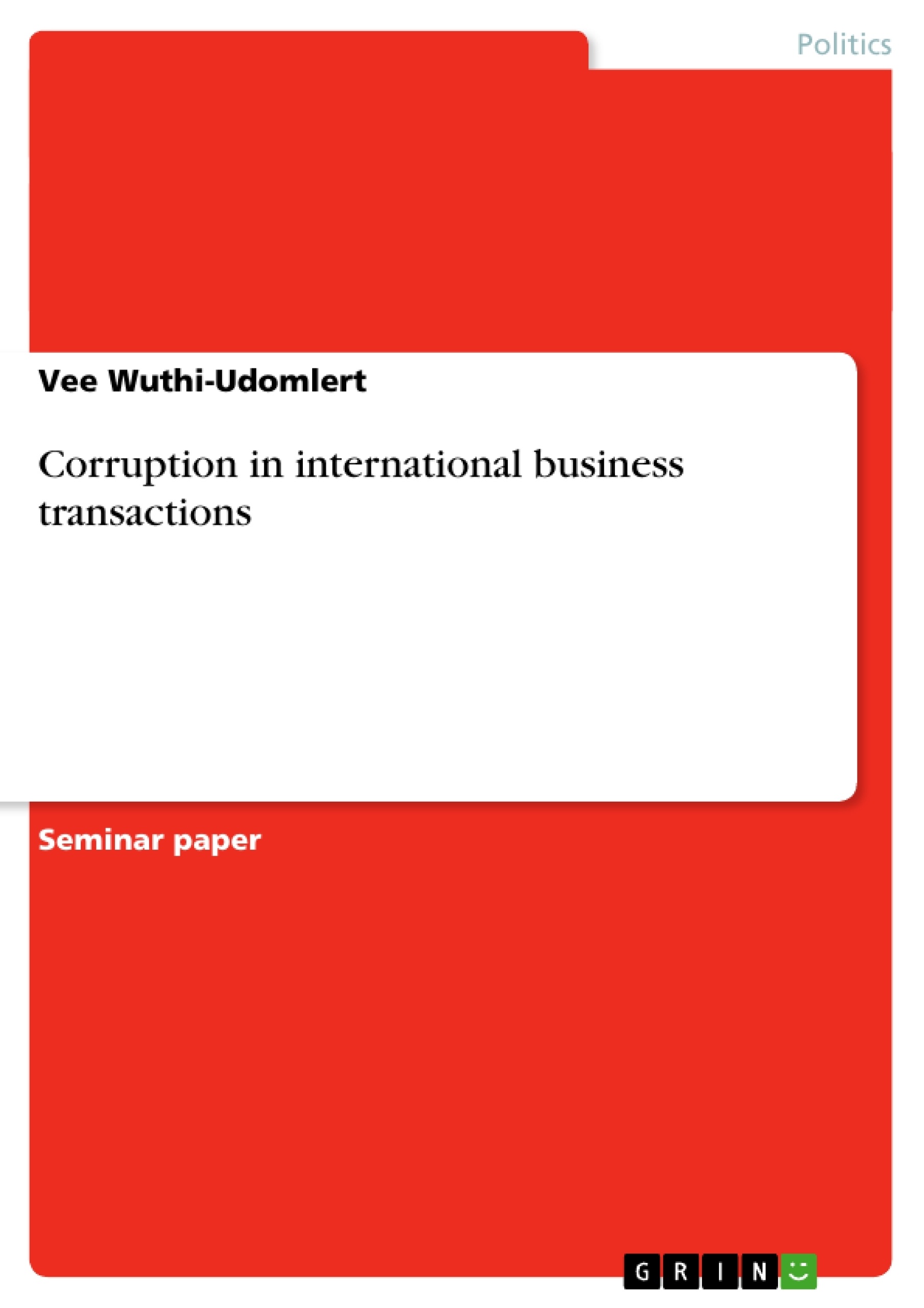The objection of this study, loosely, is to identify the causes and effects of corruption in international business transactions, the meaning of (corruption in) international business transactions and how can we detect, prevent, minimise or even resolve the problems. Thesis question: Is corruption in international business transactions an accepted norm that is tolerated globally? How has it come to be so, what harms has it done and what can we do about it?
Inhaltsverzeichnis (Table of Contents)
- Introduction
- What are international business transactions?
- What is corruption?
- Types of corruption in international business transactions
- Corruption in international business transactions
- The causes of corruption in international business transactions
- Actors involved in corruption in international business transactions
- The effects of corruption in international business transactions
- Conclusion
- Corruption as a constraint in international business transactions - The fight against corruption
- Roles of national and international, governmental and non-governmental organisations in detection, prevention, minimisation and/or resolving corruption in international business transactions
- Proposal for solution to minimise, resolve and prevent corruption in international business transaction
- Summary
Zielsetzung und Themenschwerpunkte (Objectives and Key Themes)
This study aims to investigate the causes and effects of corruption in international business transactions, defining the meaning of such corruption and exploring potential solutions to detect, prevent, minimize, and even resolve these issues. The study is guided by the question: Is corruption in international business transactions an accepted norm that is tolerated globally? How has it come to be so, what harms has it done and what can we do about it?
- Definition and typologies of corruption in international business transactions
- Causes of corruption in international business transactions
- Actors involved in corrupt activities in international business transactions
- Effects of corruption on international business transactions
- Strategies for detection, prevention, minimization and resolution of corruption in international business transactions
Zusammenfassung der Kapitel (Chapter Summaries)
The first chapter introduces the study by defining international business transactions and explaining different types of corruption that occur in this context. The chapter also explores the prevalence of corruption across various sectors, including politics, business, and everyday life.
Chapter two delves into the causes of corruption in international business transactions, analyzing the underlying factors that contribute to its emergence. The chapter also identifies the key actors involved in corrupt practices, encompassing both private and governmental entities.
Chapter three examines the effects of corruption on international business transactions. It explores how corruption impacts the functioning of markets, economic growth, and the overall business environment.
Schlüsselwörter (Keywords)
The study explores the multifaceted phenomenon of corruption in international business transactions, examining its definitions, causes, actors, effects, and potential solutions. Key terms include international business transactions, corruption, bribery, petty corruption, speed money, grease money, nepotism, patronage, red-tape corruption, kick-backs, rent-seeking, detection, prevention, minimization, and resolution. The analysis considers the roles of national and international, governmental and non-governmental organizations in combating corruption.
Frequently Asked Questions
What are the main causes of corruption in international business?
Causes include lack of transparency, weak legal enforcement, high competition for contracts, and cultural norms that may tolerate bribery or nepotism.
What is the difference between petty corruption and bribery?
Petty corruption (e.g., grease money) involves small payments to speed up routine services, while bribery often involves large sums to influence major business decisions.
How does corruption affect global markets?
Corruption acts as a market constraint, distorting competition, increasing business costs, and discouraging foreign investment in affected regions.
Who are the key actors in international business corruption?
Actors include private companies, government officials, intermediaries, and sometimes non-governmental organizations involved in global trade.
How can international corruption be minimized?
Solutions include stricter international regulations, corporate compliance programs, and the active role of organizations in detecting and preventing corrupt practices.
- Citar trabajo
- Vee Wuthi-Udomlert (Autor), 2002, Corruption in international business transactions, Múnich, GRIN Verlag, https://www.grin.com/document/21247



